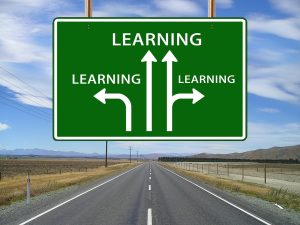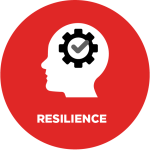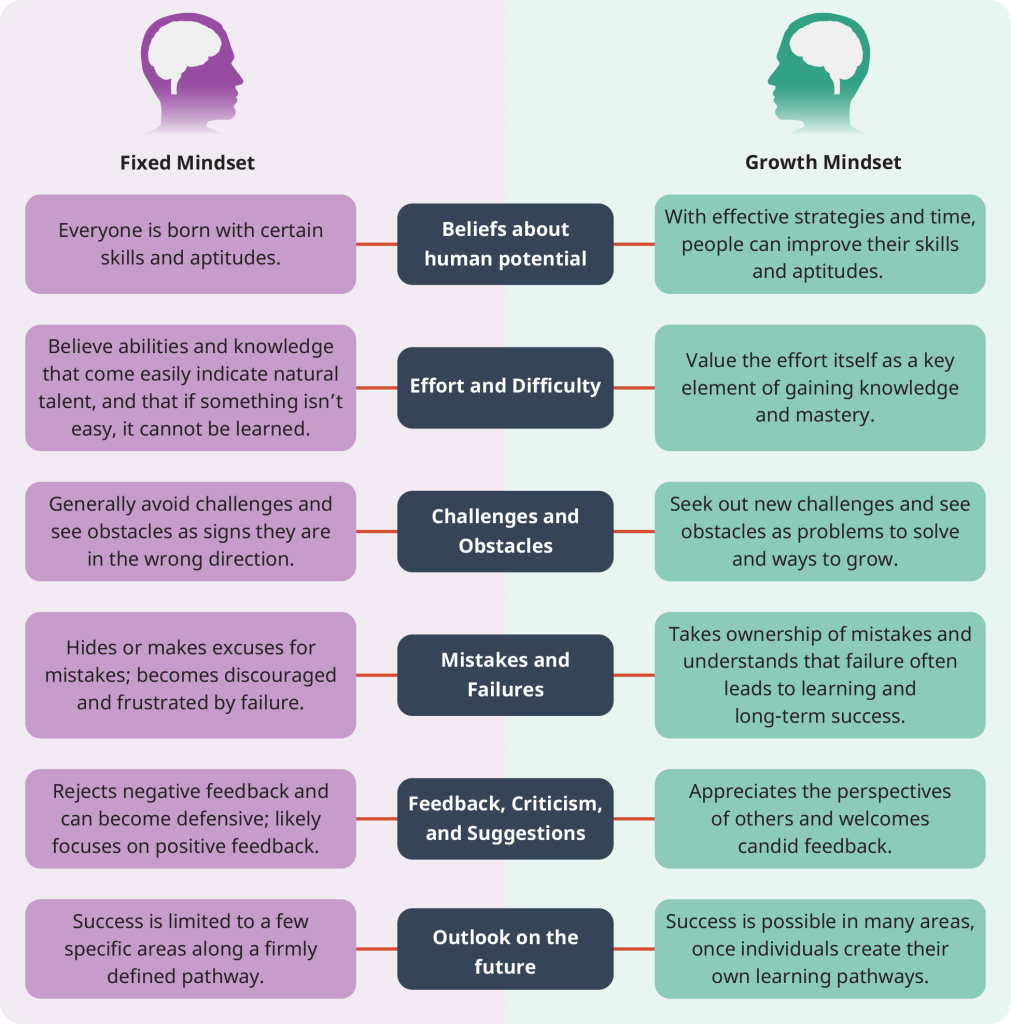2.3 What Influences Your Ability to Learn?
- What do I believe about my ability to learn?
- How much of my learning is in my own hands?
- Who can help me with my current attitude toward learning?
Traits of Successful Learners

Knowing what is going on in our brain when we learn is valuable to know, but our ability to learn is directly influenced by a variety of other factors. By examining your current situation, you can determine what might be getting in the way of your learning, who can help you at Fanshawe College as you start to take responsibility for your own learning.
Take some time to consider what you believe about your ability to achieve academic success. What you believe influences what you can achieve.
Your Attitude Toward Learning
When Things are Difficult
 Do you think of yourself as a resilient person? Do you see failure as the end of something or just the next step in learning how to do something better? When things go wrong are you able to refocus your efforts and apply a new strategy to tackle the problem? When you can’t think of anything else to do, do you give up or ask for help?
Do you think of yourself as a resilient person? Do you see failure as the end of something or just the next step in learning how to do something better? When things go wrong are you able to refocus your efforts and apply a new strategy to tackle the problem? When you can’t think of anything else to do, do you give up or ask for help?
In simple terms, resilience means your ability to keep going when things get tough. In learning, it can be thought of as a trait that drives a person to keep trying until they succeed. It is not tied to talent or ability, but is simply a tendency to not give up until something is finished or accomplished. The problem is we all understand the concept, but actually applying it takes work. If the task we are trying to accomplish is a difficult one, it can take a lot of work.
How to Develop Resilience
The first step is to adopt an attitude that looks directly to the end goal as the only acceptable outcome. With this attitude comes an acceptance that you may not succeed on the first attempt—or the nineteenth attempt. Failed attempts are viewed as merely part of the process and seen as a very useful way to gain knowledge that moves you toward success.
What Students Say
“Resilience is part of my life. Last term, I remembered two times that I had assignments for two final presentations on December 2022. I was afraid to speak in English because I needed to work on my confidence. I was practicing my speech in front of a mirror 15 times, and recorded my voice; it was a big challenge, but after this process, I became more confident. I am very thankful to my College Orientation professor Kristen Cavanagh, who was teaching me some techniques how to improve my performance and my presentation was shown in the best way.
This story is very relevant for me, because on March 2023, I had an interview, it was a professional opportunity that I had been looking for for six months since I came to Canada. In that interview, the Human Resources Manager asked me to do a ten minutes presentation; a high-impact project related to the open position, and I succeed and I am proud of the all efforts that have been made. I will continue learning every day.”
Claudia Herrera – Business Fundamentals – Fanshawe College
We saw earlier in our text that employers are looking for graduates who can demonstrate competence in complex problem solving, resiliency and self-directed learning. Every time we face a problem, seek a new way to approach it and keep moving forward, we are developing these skills.
Your Motivation
To Learn vs To Perform
In a recent survey of post secondary students in Canada, 86% reported they were motivated by grades. Earlier in this book we asked, why are you here, in college? This section provides you with the opportunity to think further about that question.
Performance Goal Focused

If you are a student with strict performance goals, your primary psychological concern might be to appear intelligent to others. At first, this might not seem to be a bad thing for college, but it can truly limit your ability to move forward in your own learning, which may have a greater impact beyond school
For example, a student who is strictly performance-goal-oriented will often only say things in a classroom discussion when they think it will make them look knowledgeable to the instructor or their classmates. They don’t often ask a question in class when they do not understand a concept because they do not want to risk looking foolish and may put down those who do. They are often very good at certain tasks because they have worked hard at them but don’t want to take on anything they don’t know.
We saw earlier in our text that employers are looking for graduates with demonstrated skills in solving complex problems, applying novel and adaptive thinking, and implementing solutions to real world problems. Doing those things involves taking risks, making mistakes, and possibly being wrong a lot before you get things right. Students focused on performing do not want to take those risks.
Learning Goal Focused
If you are a student who is driven by learning goals, your interactions in classroom discussions are usually quite different. You see the opportunity to share ideas and ask questions as a way to gain knowledge quickly. In a classroom discussion you can ask for clarification immediately if you don’t quite understand what is being discussed. If you are a person guided by learning goals, you are less worried about what others think since you are there to learn and you see that as the most important goal.

Another example where the difference between the two mindsets is clear can be found in assignments and other coursework. If you are a student who is more concerned about performance, you may avoid work that is challenging. You will take the “easy A” route by relying on what you already know. You will not step out of your comfort zone because your psychological goals are based on approval of your performance instead of being motivated by learning.
This is very different from a student with a learning-based psychology. If you are a student who is motivated by learning goals, you may actively seek challenging assignments, and you will put a great deal of effort into using the assignment to expand on what you already know. While getting a good grade is important to you, what is even more important is the learning itself.
Performing AND Learning?
If you find that you sometimes lean toward performance-based goals, do not feel discouraged. Many of the best students tend to initially focus on performance until they begin to see the ways it can restrict their learning. The key to switching to learning-based goals is often simply a matter of first recognizing the difference and seeing how making a change can positively impact your own learning.
| Performance Goal Students | Learning Goal Students |
|---|---|
|
|
| Performance Goal Students | Learning Goal Students |
|---|---|
|
|
Your Mindset – Fixed vs. Growth Mindset
The research-based model of these two mindsets and their influence on learning was presented in 1988 by Carol Dweck.
In Dr. Dweck’s work, she determined that a student’s perception about their own learning accompanied by a broader goal of learning had a significant influence on their ability to overcome challenges and grow in knowledge and ability. This has become known as the Fixed vs. Growth Mindset model. In this model, the performance-goal-oriented student is represented by the fixed mindset, while the learning-goal-oriented student is represented by the growth mindset.
In the following graphic, based on Dr. Dweck’s research, you can see how many of the components associated with learning are impacted by these two mindsets.

The Growth Mindset and Lessons About Failing
Something you may have noticed is that a growth mindset would tend to give a learner resilience and persistence. If you had learning as your major goal, you would normally keep trying to attain that goal even if it took you multiple attempts. Not only that, but if you learned a little bit more with each try you would see each attempt as a success, even if you had not achieved complete mastery of whatever it was you were working to learn.
With that in mind, it should come as no surprise that Dr. Dweck found that those people who believed their abilities could change through learning (growth vs. a fixed mindset) readily accepted learning challenges and persisted despite early failures.
Improving Your Ability to Learn
As strange as it may seem, research into fixed vs. growth mindsets has shown that if you believe you can learn something new, you greatly improve your ability to learn. At first, this may seem like the sort of feel-good advice we often encounter in social media posts or quotes that are intended to inspire or motivate us (e.g. believe in yourself!), but in looking at the differences outlined between a fixed and a growth mindset, you can see how each part of the growth mindset path would increase your probability of success when it came to learning.
Combating Negative Bias
Negative bias is the psychological trait of focusing on the negative aspects of a situation rather than the positive. An example of this in a learning environment would be earning a 95 percent score on an assignment but obsessing over the 5 percent of the points that were missed. Another example would be worrying and thinking negative thoughts about yourself over a handful of courses where you did not do as well as in others—so much so that you begin to doubt your abilities altogether.

Some level of worry and concern is natural, but an overwhelming amount of negative thoughts about yourself, including doubt in your abilities and place in school, can impede your learning and stifle your success. You can develop strategies to recognize and overcome these feelings.
Sometimes we may also hold on to old beliefs that no longer serve us well. For example, you struggled with math in high school and so you are dreading math class before it even starts. Or maybe you have been out of school for many years and just “know” you are not going to be able to keep up with all the new technology. Students from other countries often say, English is not my first language so I cannot be as successful as English first language students.
This type of thinking can be a roadblock to learning since a large part of the learning process often involves failure on early attempts. We can start to overcome our negative bias by recognizing our own negative thought patterns and stopping to question whether our thoughts are actually true and if they bring anything positive to our current situation. Another way to combat negative bias is to purposefully focus on successes and to acknowledge earlier attempts that fail as just a part of the learning.
What follows are a few methods for overcoming negative bias and negative self-talk. Each focuses on being aware of any negative attitude or emphasizing the positive aspects in a situation.
- Be aware of any negative bias. Keep an eye out for any time you find yourself focusing on some negative aspect, whether toward your own abilities or on some specific situation. Whenever you recognize that you are exhibiting a negative bias toward something, stop and look for the positive parts of the experience. Think back to what you have learned, how any lack of success is only temporary, and what you have learned that gets you closer to your goal.
- Focus on the positive before you begin. While reversing the impact of negative bias on your learning is helpful, it can be even more useful to prevent it in the first place. One way to do this is to look for the positives before you begin a task.
- Keep a gratitude and accomplishment journal. Again, the tendency to recall and overemphasize the negative instances while ignoring or forgetting about the positive outcomes is the nature of negative bias. Sometimes we need a little help remembering the positives, and we can prompt our memories by keeping a journal. Whenever you are not feeling up to a challenge or when negative bias is starting to wear on you, you can look over your journal to remind yourself of previous accomplishments in the face of adversity.
Video: Fanshawe is Here for You: Counselling Services
Video: “Fanshawe is Here for You: Counselling Services” by Fanshawe College [1:02] transcript available.
“2.3 It’s All in the Mindset” from College Success by Amy Baldwin & Open Stax is licensed under a Creative Commons Attribution License
The ability to keep trying and not give up when things get tough until something is finished or accomplished.
Goals that focus on appearing intelligent in front of others who are very good at certain tasks but often avoid taking necessary risks for the fear of appearing foolish.
Goals that focus on finding opportunities to share ideas and ask questions in order to gain more knowledge.
A student’s perception about their own learning accompanied by a broader goal of learning had a significant influence on their ability to overcome challenges and grow in knowledge and ability.
The psychological trait of focusing on the negative aspects of a situation rather than the positive.

